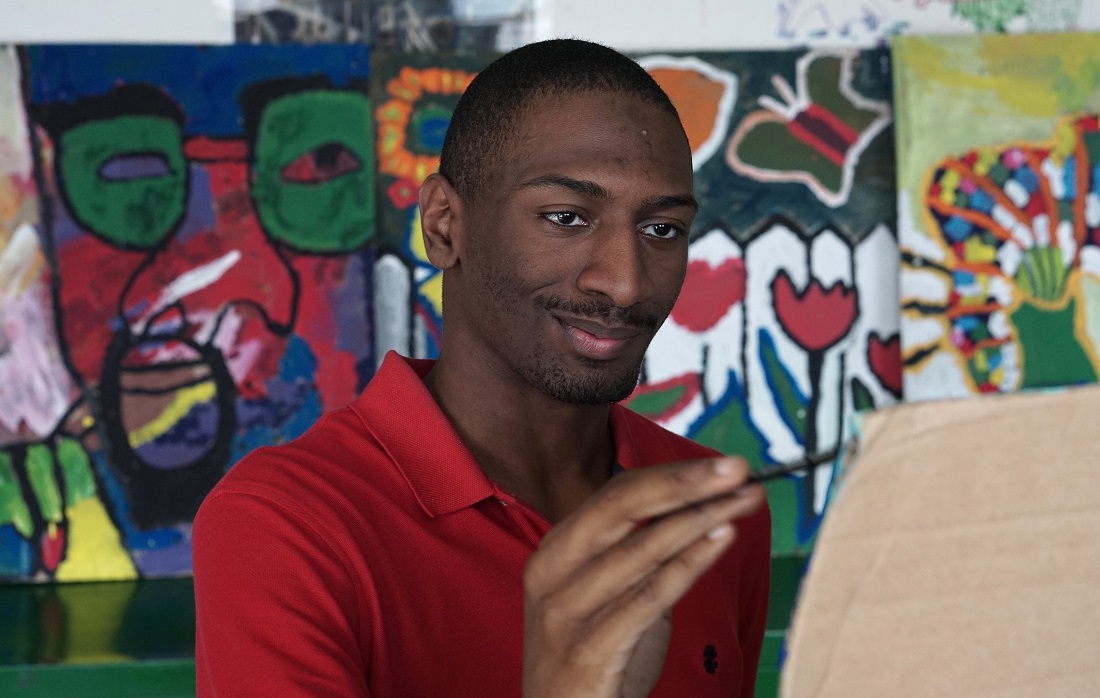March 13, 2019

Naieer Shaheed in art class at the Henderson. Dan Habib photo
By Roy Lincoln Karp
Special to the Reporter
What would it take to create a more inclusive society where every one of us is truly welcomed and valued? This is one of the most urgent questions of our time, one that can seem too daunting to tackle. It’s a question that Dan Habib has been thinking about for almost two decades.
Like most able-bodied people, Habib had not thought that much about the inclusion of people with disabilities until his son Samuel was diagnosed with Cerebral Palsy. From that day forward, he and his wife Betsy worked tirelessly to include Samuel in all aspects of their lives. Habib, a well-established photojournalist based in Concord, NH, chronicled their efforts in a critically acclaimed documentary, “Including Samuel,” which aired nationally on public television in 2008.
Habib, now resident filmmaker at the University of New Hampshire Institute on Disability, recently produced another must see film called “Intelligent Lives.” The film tells the story of three pioneering young adults with intellectual disabilities who strive to be included in high school, college, and the workforce, respectively. It also critically examines the role of intelligence testing and how the label of intellectual disability often leads to “a life sentence of isolation for the most systematically segregated people in America.”
Like “Including Samuel,” which shared the story of Keith Jones, a Boston-based disability rights activist, hip-hop artist, and scholar, “Intelligent Lives” has a number of local connections. The film introduces viewers to Naiomie Monplaisir as she seeks and finds meaningful employment at a beauty school in Providence, RI. We also follow Micah Failka-Feldman’s journey to a Certificate in Disabilities Studies at Syracuse University. His sister Emma, a Boston Public Schools teacher, speaks honestly about the challenges of working in an inclusive classroom.
For the high school perspective, we meet Naieer Shaheed, who has attended the William H. Henderson K-12 Inclusion School in Dorchester since second grade. Naieer has a diagnosis of autism and significant challenges related to speech and gross motor control. With strong support from his teachers and peers, Naieer has blossomed as an artist, creating vibrant paintings and animated films. He recently started taking classes at Mass College of Art and Bunker Hill Community College while still receiving support from the Henderson community.
Like many students with disabilities, Naieer was initially placed in separate setting from typically developing peers. “We had to fight for him to be in an inclusion environment, to be exposed to the same things that other children are exposed to,” his mother, Donna Richards, explains. “I want to see him stretch himself to his full potential.” His father, Jameel Shaheed, says, “We have to broaden our understanding of what intelligence is.”
Research has shown that, when done right, inclusive education leads to better results for both students with disabilities and those without. Says Habib: “Doing inclusion well is not resource dependent.” He has visited countless inclusive schools across the country, including many in low-income districts with underfunded schools. He has found that what works is a school-wide philosophy, buy-in from staff, and strong supports and professional development.
This idea is reinforced by Patricia Lampron, principal of the Henderson, who told me recently, “We have to create the conditions and structures where an inclusive culture can grow.” One such structure is putting kids together at a young age so they believe difference is normal. “This creates an environment where we celebrate our differences.”
My wife and I have seen first-hand the impact of the inclusive approach. When our daughter Lucy started pre-school at the Henderson in 2017, she was not walking independently, communicated primarily with sign language, and was fed exclusively by feeding tube. From the moment the rolled into the building using her Wizard Purple posterior walker, she has been a beloved and well-supported member of the community.
“Intelligent Lives” will be screened at the Reel Abilities Film Festival (reelabilities.org/boston), which runs from March 26 to April 3. This important film should spark lively discussions. I hope it also inspires action for more inclusive educational opportunities for all students. This would be an important step toward creating a more inclusive and equitable society, one in which difference does not divide us, but rather brings us together and makes us stronger.


